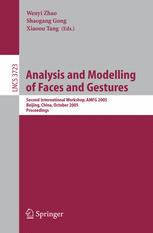

Most ebook files are in PDF format, so you can easily read them using various software such as Foxit Reader or directly on the Google Chrome browser.
Some ebook files are released by publishers in other formats such as .awz, .mobi, .epub, .fb2, etc. You may need to install specific software to read these formats on mobile/PC, such as Calibre.
Please read the tutorial at this link: https://ebookbell.com/faq
We offer FREE conversion to the popular formats you request; however, this may take some time. Therefore, right after payment, please email us, and we will try to provide the service as quickly as possible.
For some exceptional file formats or broken links (if any), please refrain from opening any disputes. Instead, email us first, and we will try to assist within a maximum of 6 hours.
EbookBell Team

0.0
0 reviewsDuring the last 30 years, face recognition and related problems such as face detection/tracking and facial expression recognition have attracted researchers from both the engineering and psychology communities. In addition, extensive research has been carried out to study hand and body gestures. The understanding of how humans perceive these important cues has significant scientific value and extensive applications. For example, human-computer interaction, visual surveillance, and smart video indexing are active application areas. Aiming towards putting such amazing perception capability onto computer systems, researchers have made substantial progress. However, technological challenges still exist in many aspects. Following a format similar to the IEEE International Workshop on Analysis and Modeling of Faces and Gestures (AMFG) 2003, this one-day workshop (AMFG 2005) provided a focused international forum to bring together well-known researchers and research groups to review the status of recognition, analysis and modeling of faces and gestures, to discuss the challenges that we are facing, and to explore future directions. Overall, 30 papers were selected from 90 submitted manuscripts. The topics of these papers range from feature representation, robust recognition, learning, and 3D modeling to psychology. In addition, two invited talks were given, by Prof. Kanade and Dr. Phillips. The technical program was organized into four oral sessions and two poster sessions. This workshop would not have been possible without the timely reviews provided by the members of the Technical Program Committee under a tight schedule. October 2005 Wenyi Zhao Shaogang Gong Xiaoou Tang